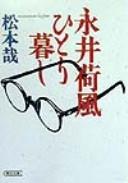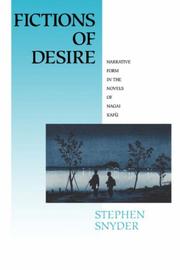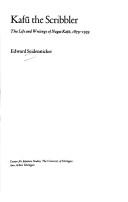| Listing 1 - 9 of 9 |
Sort by
|
Book
Year: 1965 Publisher: Stanford (Calif.) : Stanford university press,
Abstract | Keywords | Export | Availability | Bookmark
 Loading...
Loading...Choose an application
- Reference Manager
- EndNote
- RefWorks (Direct export to RefWorks)
Book
Abstract | Keywords | Export | Availability | Bookmark
 Loading...
Loading...Choose an application
- Reference Manager
- EndNote
- RefWorks (Direct export to RefWorks)
Nagai, Kafū --- 永井荷風
Book
Abstract | Keywords | Export | Availability | Bookmark
 Loading...
Loading...Choose an application
- Reference Manager
- EndNote
- RefWorks (Direct export to RefWorks)
Nagai, Kafū --- 永井荷風

ISBN: 4022642033 9784022642035 Year: 1999 Publisher: Tōkyō : Asahi Shinbunsha,
Abstract | Keywords | Export | Availability | Bookmark
 Loading...
Loading...Choose an application
- Reference Manager
- EndNote
- RefWorks (Direct export to RefWorks)
Authors, Japanese --- Authors, Japanese. --- Nagai, Kafū. --- 1900-1999.

ISBN: 0824822366 Year: 2000 Publisher: Honolulu University of Hawaii press
Abstract | Keywords | Export | Availability | Bookmark
 Loading...
Loading...Choose an application
- Reference Manager
- EndNote
- RefWorks (Direct export to RefWorks)
Japanese fiction --- History and criticism --- Nagai, Kafū, --- Criticism and interpretation.
Book
ISBN: 9781438439075 1438439075 9781438439068 1438439067 1438439083 1461907497 9781461907497 9781438439082 9781438439082 Year: 2011 Publisher: Albany, NY Suny Press
Abstract | Keywords | Export | Availability | Bookmark
 Loading...
Loading...Choose an application
- Reference Manager
- EndNote
- RefWorks (Direct export to RefWorks)
Nagai Kafū (1879–1959) spent more time abroad than any other writer of his generation, firing the Japanese imagination with his visions of America and France. Applying the theoretical framework of Occidentalism to Japanese literature, Rachael Hutchinson explores Kafū's construction of the Western Other, an integral part of his critique of Meiji civilization. Through contrast with the Western Other, Kafū was able to solve the dilemma that so plagued Japanese intellectuals—how to modernize and yet retain an authentic Japanese identity in the modern world. Kafū's flexible positioning of imagined spaces like the "West" and the "Orient" ultimately led him to a definition of the Japanese Self. Hutchinson analyzes the wide range of Kafū's work, particularly those novels and stories reflecting Kafū's time in the West and the return to Japan, most unknown to Western readers and a number unavailable in English, along with his better-known depictions of Edo's demimonde. Kafū's place in Japan's intellectual history and his influence on other writers are also discussed.
Civilization, Western, in literature --- East and West in literature --- Nagai, Kafū, --- Nagai, Sōkichi --- Kafu, Nagai --- 永井荷風 --- 永井苛風 --- 永井荷风 --- 永开荷風 --- Criticism and interpretation. --- Japan --- In literature. --- Civilization, Western, in literature. --- East and West in literature. --- Literature. --- Nagai, Kafū, --- Japan. --- J4127 --- J4129 --- Japan: Sociology and anthropology -- social identity and self --- Japan: Sociology and anthropology -- cross-cultural contacts, contrasts and globalization --- Nagai, Kafu,
Book
ISBN: 9004345388 9789004345386 9789004345379 900434537X Year: 2017 Publisher: Leiden Boston
Abstract | Keywords | Export | Availability | Bookmark
 Loading...
Loading...Choose an application
- Reference Manager
- EndNote
- RefWorks (Direct export to RefWorks)
In A Sense of the City , Gala Maria Follaco examines Nagai Kafū’s (1879-1959) literary construction of urban spatialities from late Meiji through the early Shōwa period. She argues that Kafū’s urban critique was based on his awareness of the cultural sedimentation of the cityscape and of the complex relationship that it bore with the historical framework of modern Japan. With the overall aim to define Kafū’s position within pre-war Japanese literature, Follaco touches upon key issues such as memory, class difference, and language ideologies; draws connections between his sojourn abroad and strategies of “mapping” the city of Tokyo in his literature; and takes into account works previously understudied, including his biography of Washizu Kidō and his photographs.
Cities and towns in literature. --- Space (Architecture) in literature. --- Nagai, Kafū, --- Nagai, Sōkichi --- Kafu, Nagai --- 永井荷風 --- 永井苛風 --- 永井荷风 --- 永开荷風 --- Criticism and interpretation.
Book
ISBN: 1282796631 9786612796630 023152272X 9780231522724 9780231151467 0231151462 9781282796638 6612796634 Year: 2010 Publisher: New York, NY
Abstract | Keywords | Export | Availability | Bookmark
 Loading...
Loading...Choose an application
- Reference Manager
- EndNote
- RefWorks (Direct export to RefWorks)
The attack on Pearl Harbor, which precipitated the Greater East Asia War and its initial triumphs, aroused pride and a host of other emotions among the Japanese people. Yet the single year in which Japanese forces occupied territory from Alaska to Indonesia was followed by three years of terrible defeat. Nevertheless, until the shattering end of the war, many Japanese continued to believe in the invincibility of their country. But in the diaries of well-known writersincluding Nagai Kafu, Takami Jun, Yamada Futaru, and Hirabayashi Taikoand the scholar Watanabe Kazuo, varying doubts were vividly, though privately, expressed.Donald Keene, renowned scholar of Japan, selects from these diaries, some written by authors he knew well. Their revelations were sometimes poignant, sometimes shocking to Keene. Ito Sei's fervent patriotism and even claims of racial superiority stand in stark contrast to the soft-spoken, kindly man Keene knew. Weaving archival materials with personal recollections and the intimate accounts themselves, Keene reproduces the passions aroused during the war and the sharply contrasting reactions in the year following Japan's surrender. Whether detailed or fragmentary, these entries communicate the reality of false victory and all-too-real defeat.
Authors, Japanese --- World War, 1939-1945 --- World War, 1939-1945, in literature --- Literature and the war. --- Nagai, Kafū, --- Takami, Jun, --- Yamada, Fūtarō, --- Yamada, Fuhtaro, --- Yamada, Seiya, --- Yamada, Kazetarō, --- 山田風太郎, --- Takama, Yoshio, --- 高見順, --- Nagai, Sōkichi --- Kafu, Nagai --- 永井荷風 --- 永井苛風 --- 永井荷风 --- 永开荷風 --- 高間芳雄,

ISBN: 0939512467 Year: 2003 Volume: no. 3 Publisher: Ann Arbor : Center for Japanese Studies, University of Michigan,
Abstract | Keywords | Export | Availability | Bookmark
 Loading...
Loading...Choose an application
- Reference Manager
- EndNote
- RefWorks (Direct export to RefWorks)
Neither pure biography nor pure criticism nor yet a pure anthology, but a blending of the three, Kafū the Scribbler is an introduction to Nagai Kafū and his city, accompanied by a fairly generous sampling from his works.
J2284.70 --- J5500.70 --- J5931 --- Japan: Genealogy and biography -- biographies -- kindai (1850s- ), bakumatsu, meiji, taishō --- Japan: Literature -- history and criticism -- modern, Kindai (1850s- ), bakumatsu, Meiji, Taishō --- Japan: Literature -- modern fiction and prose (1868- ) -- criticism --- Nagai, Kafū, --- Nagai, Sōkichi --- Kafu, Nagai --- 永井荷風 --- 永井苛風 --- 永井荷风 --- 永开荷風 --- Criticism and interpretation. --- Japan --- al-Yābān --- Giappone --- Government of Japan --- Iapōnia --- I︠A︡ponii︠a︡ --- Japam --- Japani --- Japão --- Japon --- Japonia --- Japonsko --- Japonya --- Jih-pen --- Mư̄ang Yīpun --- Nihon --- Nihon-koku --- Nihonkoku --- Nippon --- Nippon-koku --- Nipponkoku --- Prathēt Yīpun --- Riben --- State of Japan --- Yābān --- Yapan --- Yīpun --- Zhāpān --- Япония --- اليابان --- يابان --- 日本 --- 日本国 --- In literature. --- Literary collections. --- Jepun --- Yapon --- Yapon Ulus --- I︠A︡pon --- Япон --- I︠A︡pon Uls --- Япон Улс --- Nagai, Kafū
| Listing 1 - 9 of 9 |
Sort by
|

 Search
Search Feedback
Feedback About UniCat
About UniCat  Help
Help News
News